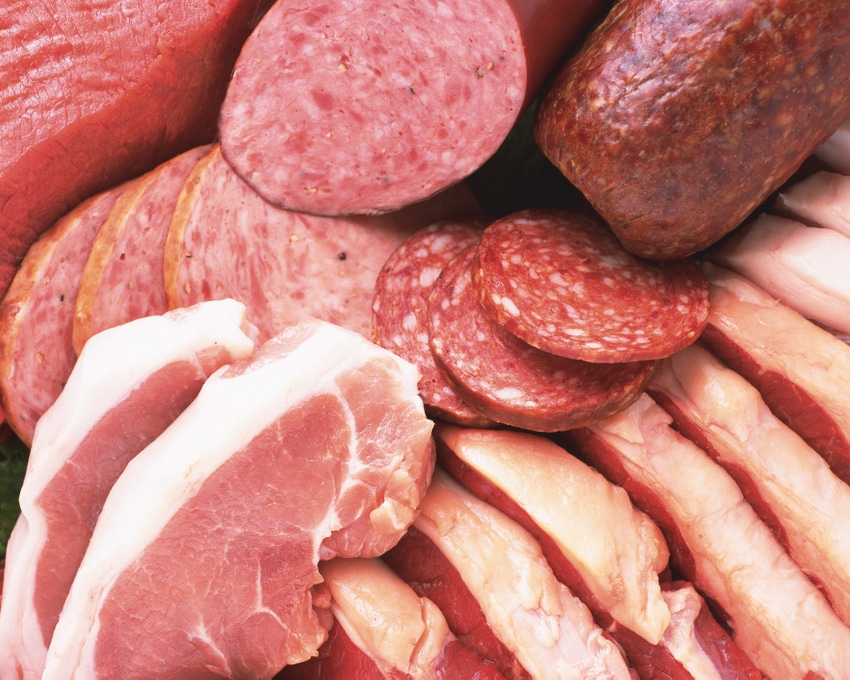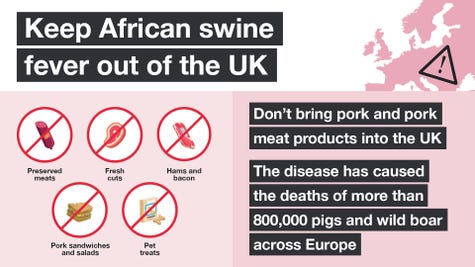Campaign to raise awareness of African swine fever and risks of bringing contaminated products across national borders.
July 31, 2019

The U.K. Department of Food, Environment & Rural Affairs (DEFRA) and U.K. Border Force launched new campaign July 31 meant to help keep the damaging animal disease African swine fever (ASF) out of the country.
The disease, which poses no threat to human health but is fatal for pigs, has already spread widely across parts of Central and Eastern Europe and through Asia, including China and Vietnam. Cases have also been reported throughout sub-Saharan Africa, where the disease is often endemic.
DEFRA said this has led to the deaths of more than 800,000 pigs and wild boars in Europe and an estimated 4 million pigs in Asia, causing global pork prices to rise. If the disease was found in the U.K., it could have a devastating impact on the country’s commercial pig stock of 5 million pigs as well as the trade of pork products, DEFRA said.
According to the announcement, the main ways ASF can spread are:
Tourists or travelers bringing contaminated pork products with them from infected areas. All travelers are strongly advised to avoid bringing any pork products — including preserved meats, ham or pork sandwiches — back to the U.K. Bringing in potentially contaminated pork products from affected regions is an offence and can result in prosecution and a large fine.
Pig keepers and members of the public feeding catering waste, kitchen scraps or pork products to their animals, which is illegal in the U.K.
Travelers returning from ASF-affected areas coming into contact with domesticated pigs, commercial holdings or smallholdings. The disease can spread via contaminated clothing, footwear or equipment, as well as pork products.
Contaminated vehicles and equipment being taken onto commercial pig premises or workers wearing contaminated clothing or boots when entering pig premises.
“Keeping African swine fever out of the U.K. is one of my top priorities," U.K. chief veterinary officer Christine Middlemiss said. “As we have seen around the world, its impact on pig farmers and the wider pork industry has been devastating. The virus survives incredibly well in pork meat and can survive for months in smoked, dried and cured meats and likely years in frozen meat.
“That is why it is crucial that anyone traveling from affected regions takes this advice seriously in order to ensure that there is no spread of the disease to animals in the U.K.,” she added.
DEFRA said the new campaign aims to safeguard the U.K.’s pork and pig industries by targeting anyone who has the potential to introduce ASF to the U.K. It includes a new poster campaign, which will be introduced to U.K. airports and ports throughout the summer, to raise awareness of the disease and the risks of bringing back contaminated products.

Border Force officers enforce controls at the border on illegal meat by searching freight, passengers and luggage and will seize and destroy illegally imported meat products.
“While there has never been an outbreak of African swine fever in the U.K., we are not complacent and already have robust measures in place to protect against animal disease outbreaks," U.K. Biosecurity Minister Lord John Gardiner said. “This poster campaign at U.K. airports and ports adds to the strict control measures we have put in place to ensure that no live pigs, wild boar or pork products from affected areas reach the U.K."
Dr. Zoë Davies, chief executive of the National Pig Assn., said, "We have always stressed that the biggest threat to our pig herd is from products coming in from affected countries, so this is an important step to help keep ASF from entering our country.
“The government has estimated that a ‘reasonable worst-case scenario’ ASF outbreak could cost the country £90 million. We believe the figure would be much higher, and that is why we need to mobilize every available resource and effort to help prevent such a catastrophe,” Davies added.
You May Also Like

.png?width=300&auto=webp&quality=80&disable=upscale)

